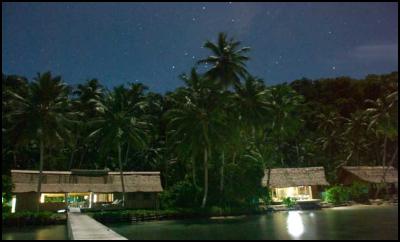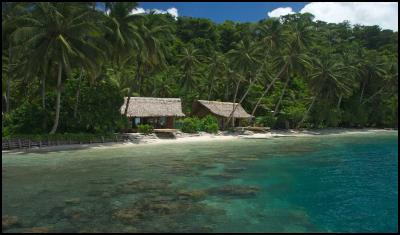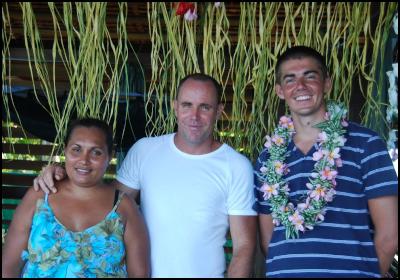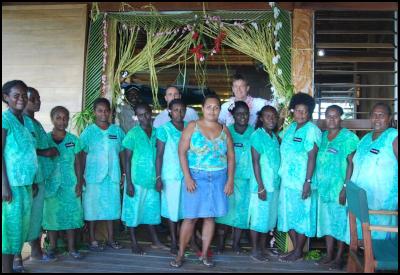Australia Supports Sustainable Eco-tourism Project
Australia Supports Sustainable Eco-tourism Project in Western Province
21 December 2010
Two new eco-friendly guest bungalows have been officially opened at the Wilderness Lodge on Gatokae Island in Western Province, with support from a grant of SBD $770,000 provided by the Australian Agency for International Development (AusAID) under the Enterprise Challenge Fund (ECF).
The AusAID funding has also been used to expand and strengthen the Wilderness Lodge’s human resources, including through hospitality training of local staff in conjunction with other ecotourism operations.

The ECF is an Australian Government initiative which aims to assist in commercialising business projects in participating countries. The fund targets projects that will stimulate growth and ensure that the poor are included in the consequent benefits and opportunities.
ECF In-Country Manager, Bob Pollard, who has helped facilitate the Wilderness Lodge initiative, said the project’s close linkages with communities, the training of local people to undertake key roles in the business, and its comprehensive environment protection strategy represent a model that can be replicated in other locations in Solomon Islands and elsewhere.

At the official launch of the bungalows, Australian High Commission representative, William Ewing, said Australia was pleased to support projects in Solomon Islands that benefit local communities and help to generate sustainable development.
He said “the Wilderness Lodge is a great example of what can be achieved through cooperation between communities and local commercial enterprises. Private sector development is essential for sustainable economic development and underpins Australia’s goal of reducing poverty in the Pacific.”
The Wilderness Lodge’s local owner, Waelinah Howell, and Project Manager, Corey Howell, said the project is expected to provide increased incomes to local villages where government services and other livelihood opportunities are limited.

Benefits from the new bungalows, which overlook some of the world’s richest and most intact coral reefs and tropical rainforests, will come in the form of increased wages, training, contracts, local product sales, tours and access fees, as well as improved access to telecommunications and transport services as the business expands.
Australia will provide AU $20.5 million dollars over six years to pilot the ECF in the Pacific and South-East Asia.

Grants of AU $100,000 to $1.5 million have been awarded to business projects with pro-poor outcomes that cannot obtain financing from commercial sources. At least 50 per cent of the project costs must be met by the partner business, and all projects must be commercially self-sustaining within three years.
For more information on AusAID’s Enterprise Challenge Fund, visit http://www.enterprisechallengefund.org/.
For more information on the Wilderness Lodge, visit http://www.thewildernesslodge.org/.
ENDS


 UN News: Indigenous Peoples Sidelined In Global Climate Fight, UN Warns
UN News: Indigenous Peoples Sidelined In Global Climate Fight, UN Warns Ocean Conservancy: Ocean Conservancy Condemns Deep Sea Mining Executive Order
Ocean Conservancy: Ocean Conservancy Condemns Deep Sea Mining Executive Order UNICEF Aotearoa NZ: Increases In Vaccine-Preventable Disease Outbreaks Threaten Years Of Progress, Warn WHO, UNICEF, Gavi
UNICEF Aotearoa NZ: Increases In Vaccine-Preventable Disease Outbreaks Threaten Years Of Progress, Warn WHO, UNICEF, Gavi Save The Children: Vanuatu - Families Find Climate-Smart Ways To Grow Crops 18 Months On From Cyclone Devastation
Save The Children: Vanuatu - Families Find Climate-Smart Ways To Grow Crops 18 Months On From Cyclone Devastation New Zealand Catholic Bishops Conference: Cardinal Dew Leaves For Pope's Funeral, Papal Election
New Zealand Catholic Bishops Conference: Cardinal Dew Leaves For Pope's Funeral, Papal Election The Nature Conservancy: Bird Species Lost From Wild For Almost 40 Years Lays First Eggs On New Island Home
The Nature Conservancy: Bird Species Lost From Wild For Almost 40 Years Lays First Eggs On New Island Home